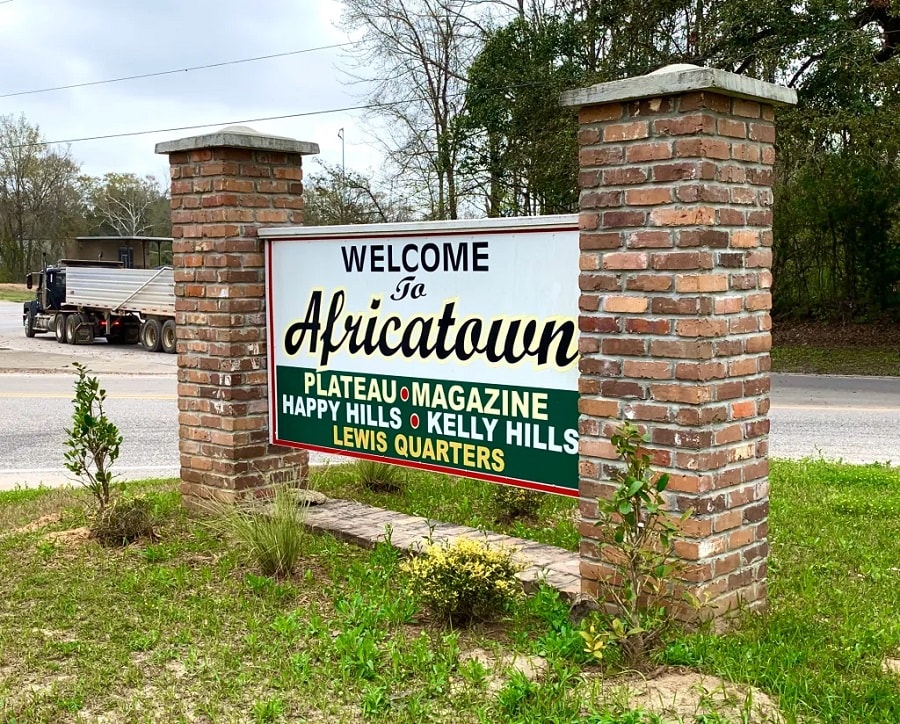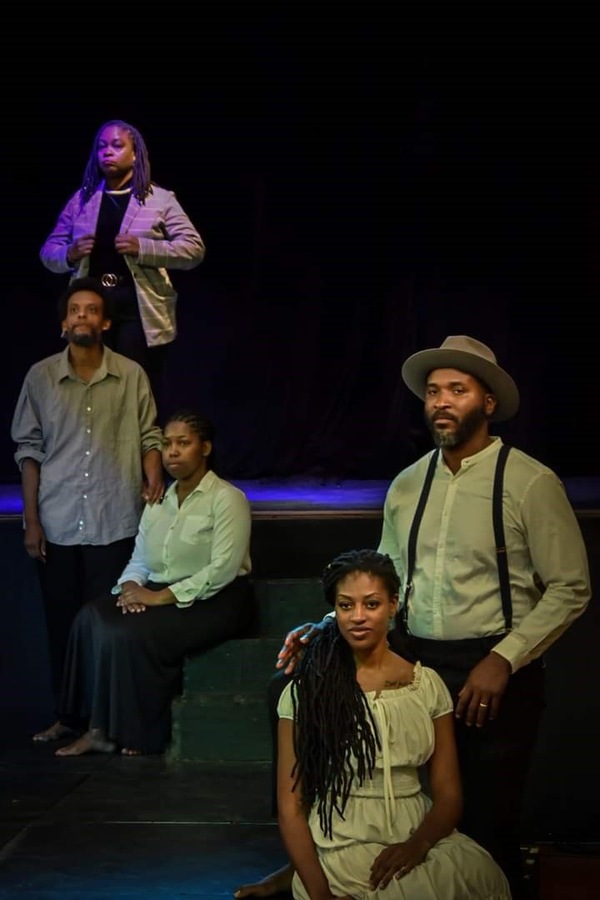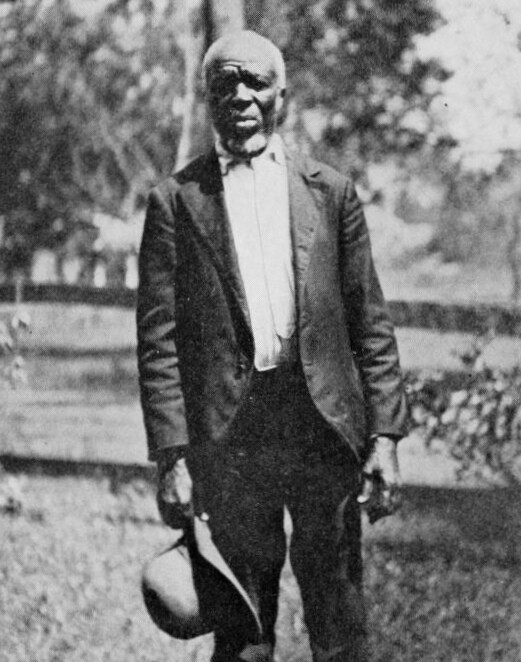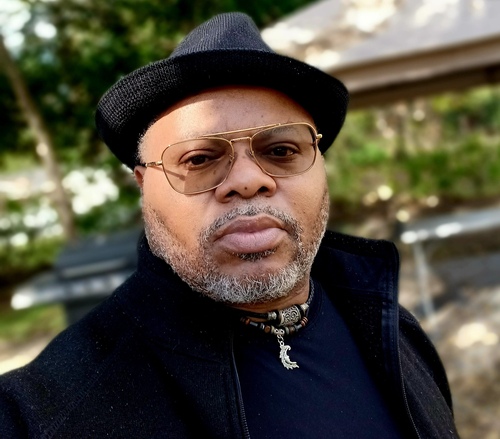The Rising Tide of ‘An Ocean in My Bones’

Jiant Kuumba and company in “An Ocean in My Bones.” (Photo by Ashley Waller)
The Rising Tide of ‘An Ocean in My Bones’
Earlier this month, Terrence Spivey’s play about the last slave ship, Clotilda, had its premiere in the Alabama community its survivors built.
On Feb. 4 and 5, the world premiere of An Ocean in My Bones took place in the crowded gymnasium of the Mobile County Training School in Alabama, with more than 700 people from Alabama and around the country filled the space to capacity both nights.
But this was not just any gymnasium. It had been built a century and a half ago by people brought to Mobile against their will as “black cargo” on the Clotilda, the last known slave ship to carry illegally abducted people from Africa to American shores in 1860. As Ocean’s playwright and director, Cleveland-based Terrence Spivey, said of the performances, “There was a beautiful vibe between a packed audience and artists performing on ancestral grounds in a place the Clotilda survivors built. It was riveting. Having a chance to perform a play about the ancestors in a school they had built made for great site-specific theatre.”
For the previous few weeks, the school had seen a flurry of activity as light grids were installed and bleachers positioned around a thrust stage to convert its gym into a theatre space for An Ocean in My Bones. But the play’s history goes back to pre-Civil War years, when the Clotilda 110, as those enslaved people are popularly known, came from different parts of West Africa, including villages of Nigeria, near Dahomey, now Benin. After they were emancipated in 1865, they built their own community—comprising the school, the Union Missionary Baptist Church, and various homes and businesses—on land they purchased in the neighborhood known as Plateau, and they renamed it Africatown.

Spivey’s play was commissioned and funded by the sixth generation of the original families, who formed the Clotilda Descendants Association (CDA) a few years ago, and it was performed during the town’s Fifth Annual Spirit of Our Ancestors Festival.
“I’ve been very moved by Terrence’s work to bring the story to life,” said Jeremy Ellis, current president of the Clotilda Descendants Association (CDA), and a direct descendant of Pollee and Rose Allan, who were aboard the Clotilda. “It is an outstanding play, but the opportunity to hear from our ancestors and see An Ocean in My Bones with other descendants gave the experience monumental significance.” Ellis estimated that roughly 30 or more descendants attended the performances earlier this month.
At the top of the play, Prince Peter Lee, known as Gumpa, and several other villagers are talking in a small West African village. Lurking in the shadows, intimidatingly visible to some of the audience, 10 Dahomey warriors stand frozen before springing into action onto the stage, attacking Gumpa and the others. After several minutes of fiercely choreographed fighting, the warriors overcome the villagers, herding them into barracoons, or confined areas.
“Terrence effectively staged the Dahomey warriors coming to abduct our ancestors into slavery,” said Joycelyn Davis, descendant of Clotilda passengers Oluale “Charlie” Lewis and his wife Maggie, cofounder of the CDA, and founder of the Spirit of Our Ancestors Festival. “That kind of brought chills to me, the recreating of that trauma.”
At one point, Davis invited a group of students from Mobile County Training School in to see the play, since she believes it’s an important story for them to learn. “I saw them at the door trying to peep in like kids do,” she said with a chuckle. “After all, it is their school.”
Delisha Marshall, the great great great granddaughter of Gumpa, also said she was entranced by the opening.
“I had heard the stories from my grandmother about the abduction, but actually seeing them act it out was just like, Wow!,” she said. “There was a powerful emotional component to it that I wasn’t expecting, so that stood out the most to me.”
Marshall grew up playing in the shadow of the towering brick chimney that stood in Gumpa’s family home—the last remaining artifact of the original Africatown structures. The discovery of the remains of the Clotilda in 2019, she adds, validated all the ancestral tales her late grandmother had regaled her with. “She told me, ‘A lot of people say that it is a myth and didn’t happen, but that’s how our family got here.’”

The play next shows Gumpa dragged before Glele, Dahomey’s king, who trades a young member of his royal family and the other captives to William Foster, captain of the Clotilda, and his shipmates for $9,000 in gold. Foster had been hired by Mobile shipping magnate and slave owner Timothy Meaher, who had wagered that it couldn’t be done because the importing of slaves from Africa had been outlawed by the U.S. in 1808 (a ban that was obviously not well enforced, and which did not apply to the domestic slave trade). Both characters play key roles in the play.
Acting as narrators are actors playing three of the four authors who later wrote about Africatown and the Clotilda survivors: Sylviane Diouf, Natalie Robison, Zora Neale Hurston, and Emma Langdon Roche, a Mobile resident who wrote the first book about the survivors. The actor-narrators remain perched on 4×4 platforms at the corners of the stage, from which they interact with the characters or break the fourth wall to directly address the audience.
Near play’s end, a fifth writer, Deborah Plant, enters. An African American literature and Africana Studies scholar and literary critic whose special interest is the life and works of Hurston, Plant notes that Hurston’s book, Barracoon: The Story of the Last “Black Cargo”—about Cudjo Lewis, whom she interviewed and filmed in Africatown—was not published until 2018. Despite her success and acclaim, it says something about the contestation of Black history that even the bold young Hurston could not find a publisher when she wrote her account 90 years ago. Plant edited Hurston’s recently published book.
Altevese Rosario, a descendant of Cudjo Lewis and vice president of the CDA, remembers sitting at her grandmother’s feet and hearing her talk about Cudjo and his life, in much the same way her grandmother had sat at Cudjo’s own feet as he told her. She would even replicate Cudjo’s dialect in the telling, Rosario recalled. He died in 1935, when Rosario’s grandmother was a teenager.
“Cudjo was proud of who he was, where he came from, and the life that he lived,” Rosario said. “He always made sure that each generation that he touched knew his story, understood the nuances of his story, and pledged to continue to tell his story.”

Seeing An Ocean in My Bones was especially gratifying to Rosario, she said, especially the chance to hear her ancestors’ voices through the actors.
“In films or interviews, it’s us or someone else speaking about the life of my ancestor as opposed to a person portraying him,” Rosario said. Seeing these accounts staged, she said, “made it a little more real and emotional, because the actor is taking the words of my ancestor and bringing them to life.”
Though Spivey had known of infamous slave ships like the Amistad and had been taught the history of the Middle Passage, he only began to learn of the Clotilda’s connection to Mobile in 2011, when Greg Cyprian came to Cleveland to see Spivey’s musical adaptation of James Weldon Johnson’s book God’s Trombones at Karamu House, the oldest African American theatre in the U.S., of which Spivey was then artistic director. Cyprian, who was attempting to start Mobile’s first Black theatre, introduced Spivey to the Africatown story. The two remained in touch, and Cyprian went on to found Imani Theatre Company.
In 2011, the Direct Descendants of the Clotilda Inc. was effectively shuttered when its founder, Beatrice Ellis, died, and the rest of the members were elderly and no longer active. The new CDA organization that Ellis’s grandson Jeremy now presides over was founded by Jocelyn Davis, Pat Frazier, and others in 2018-19, around the time the remains of the Clotilda were discovered at the bottom of the Mobile River not far from Africatown.
By the spring of 2020, as Hurston’s seminal study and other books about Africatown had been published—and a documentary film called Descendant was in the works—Davis began looking for someone who could tell the story of the Clotilda and Africatown as a play. Cyprian suggested she contact Spivey.
“I like to get things done, though I didn’t know what I was getting into producing a play,” recalled Davis about reaching out to Spivey via a Facebook message to write and direct a new play for the Africatown’s third Spirit of Our Ancestors Festival in February 2021 for Black History Month. “I just felt something needed to be done to bring the Africatown/Clotilda story to light with live actors.”
Intrigued by the story from his earlier discussions with Cyprian, Spivey was definitely interested, but COVID-19 and prior commitments—including his play Ma’afa, about the slave trade—delayed his involvement by a few years. When he finally dug into the material, Spivey said, “What got me about the Africatown story was we are all descendants, but they actually know their ancestors.” He was also struck by “the strength their ancestors had when they came here and said, ‘We’re going to name Plateau Africatown. We’re going to bring our customs, our traditions, crops, everything here, and make it our home.’”

Spivey did his research: He read all the books about Africatown, got Cyprian’s tour of Africatown (which he at first thought was a film set, because of the ancient feel of the rebuilt structures), and interviewed many of the descendants, speaking with as many as he could in person so that he could note body movements and gestures he could later convey to his actors.
Davis had hoped to have a full production by February 2022, but Spivey’s time to work on the project has been limited, so they agreed he would write a 45-minute one-act. Despite lingering pandemic caution, they drew an audience of about 400 people. But Spivey kept working on a full-length version, and he had a fresh source to consult: Ben Raines not only published the book The Last Slave Ship: The True Story of How Clotilda Was Found, Her Descendants, and an Extraordinary Reckoning, he also took Spivey out on a boat to the undisclosed site of the Clotilda’s sunken wreck.
Spivey expanded the opening sequence of the attacking Dahomey tribesmen, increasing the number of warriors from 4 to 10 to amplify the intensity and relevance of the raid and enhance the fight choreography. While the 30-person cast was made up of a lot of inexperienced actors from Mobile, Spivey also brought in several veteran actors, including Ashley Austin, and two men he had worked with many times at Karamu in Cleveland: Rodney Freeman, who played William Foster, and Skip Corris, who played Timothy Meaher.
The production also featured live music from the Clotilda Ensemble, comprising 10 college students from the University of South Alabama, under musical director Kenneth Brandon and Wayne Curtis, head of the African drumming troupe MADD (Mobile, Alabama Africatown Drummers).
After the exciting success of the sold-out full production this year, Spivey, Davis, and the other descendants hope to find funding to produce the play in other cities. They would also like to tour it to HBCU campuses, Spivey said, and to other schools. Davis would like to see a Performing Arts Center built in Africatown, since there is land available for it. Annual productions in Africatown are part of the plan as well.
